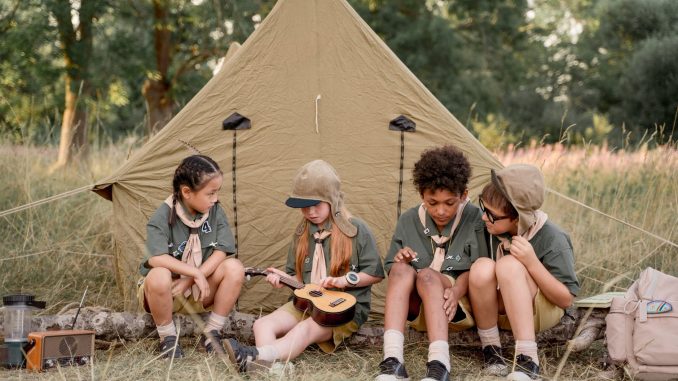
You’d be hard pressed to find a kid who didn’t love the concept of playing around in a tent. There’s just something about being in such a private little space, sharing secrets with friends and telling stories that grown ups wouldn’t understand. Finding the perfect play tent is the first step in enhancing this important childhood experience, but you can also use their love for the outdoors to teach them important survival and wilderness skills–even if you never leave your backyard!
The number one fear parents have when their kids go for a real camp out (or anywhere for that matter…)? Getting lost. For those children who haven’t quite earned their wilderness survival merit badges yet, give them a few pointers for staying safe during hikes and camp outs in the woods. Tell them to always stay close to other children and chaperons and to use the buddy system whenever possible. You can also give them a whistle to alert others if they become separated from the group. And, most importantly, if they do get lost, instruct them to stay in one place and wait for help. You can simulate this at your pretend campsite by having them go on a imaginary hike with everyone holding hands, shirt sleeves, or a rope that everyone can share. If your ears can take it, you can also let them go nuts with their emergency whistles. (found at most dollar stores across America)
Have the kids practice “Stop, Drop, and Roll” around the yard, and inform them of ways to prevent fires from getting out of control at a camp out: keep flames within a structured barrier, avoid dry areas with lots of dead grass or brush, and always keep water handy just in case.
Use your own pets, or the neighbor’s golden retriever, to show kids who to respond to a wild animal. For bears, try and avoid them when at all possible. As you walk through the woods and around your campsite, make as much noise as you can by rattling pots and pans or singing campfire songs. This will help alert any bears in the area that there are humans present, and they will generally stay away. Close food containers tightly, and hang them high on specialized poles or tree branches. And, if you do see a “bear”, talk to it in a normal voice and wave your arms so it can see that you are human. Try and walk away diagonally. If the bear does make contact, surrender by lying on the ground and playing dead. This will make a fun game for kids, as well as educate them for how to react in an actual dangerous situation.
Now you can get down to the fun stuff. Sit around the campfire, real or otherwise, and show the kids how to tie knots, cook over a fire, and tell stories about your own camping experiences.
Once the pretend camping trip is over, encourage them to get out with their play tent roll up their sleeping bags and practice what they learned. Now you can go on a real camp out knowing that your child will understand what to do in any situation. So get out and enjoy the wilderness…and don’t forget the marshmallows.


